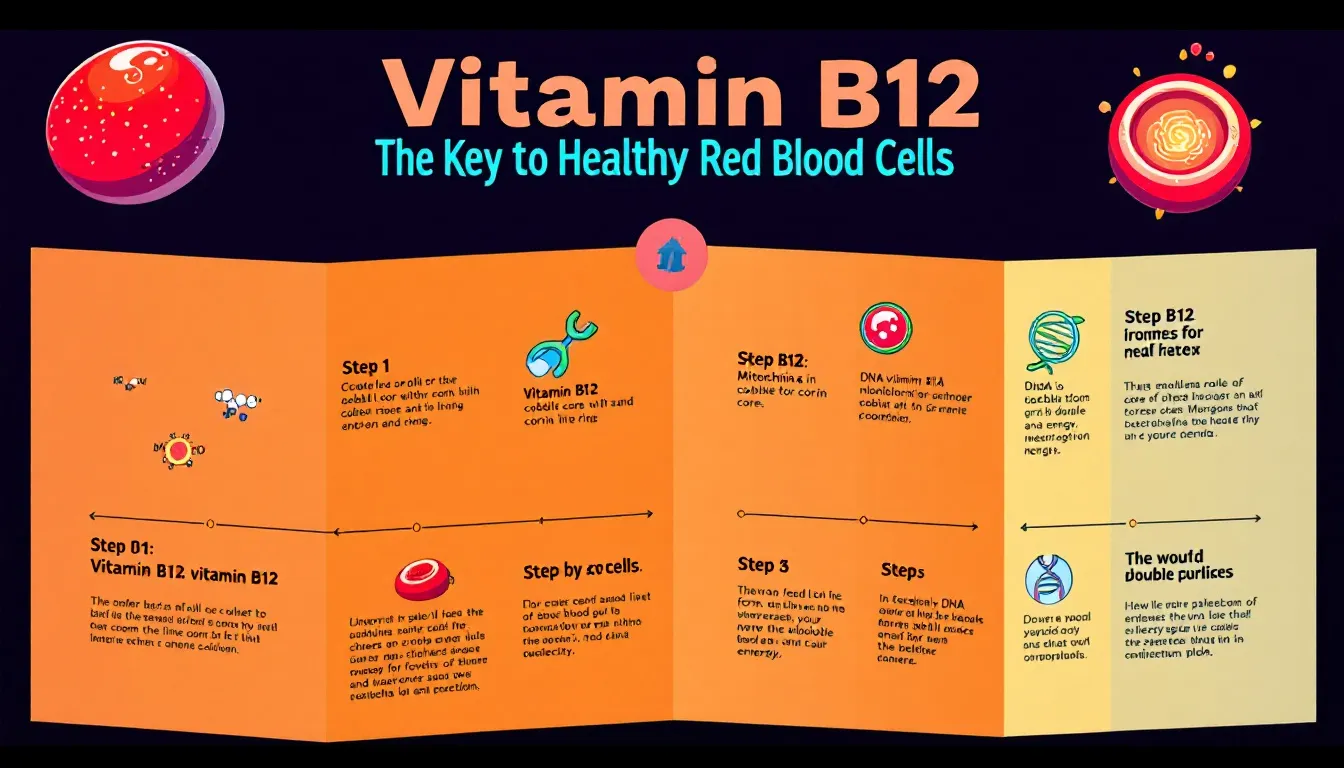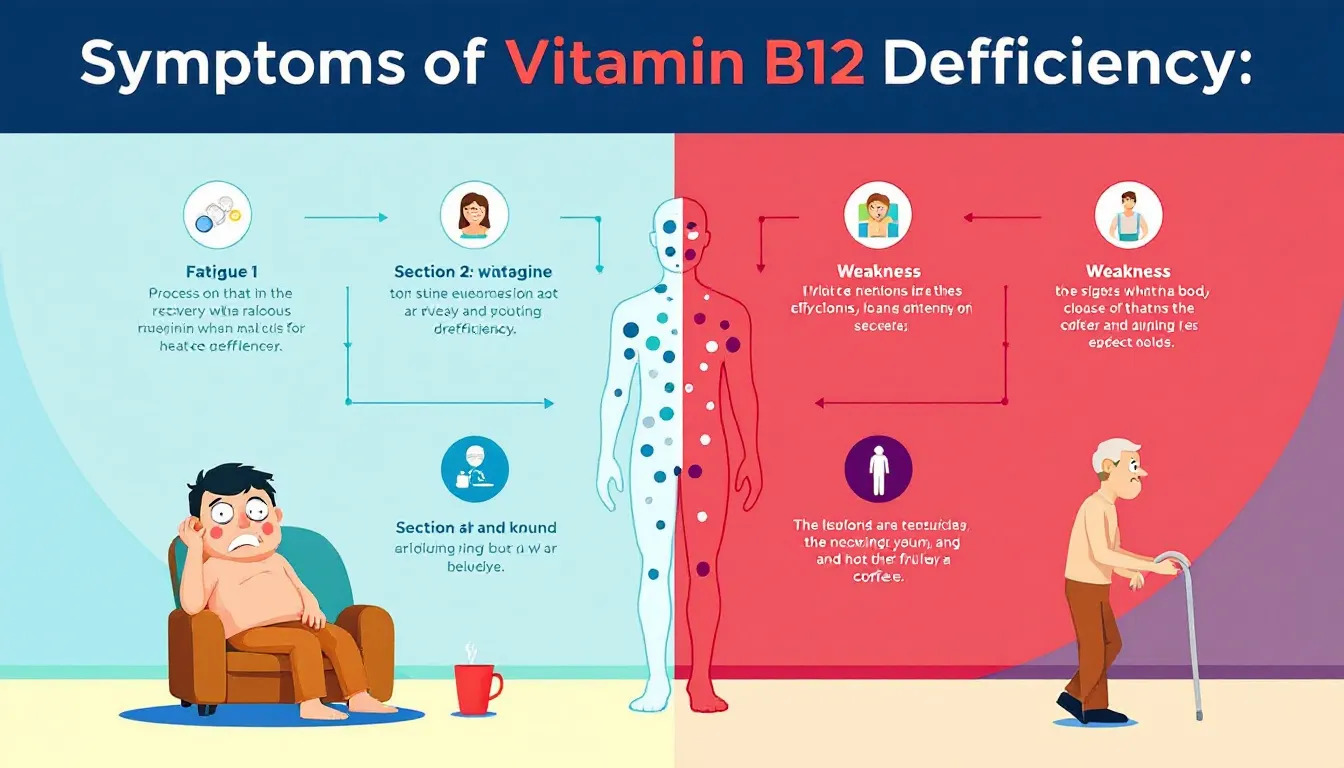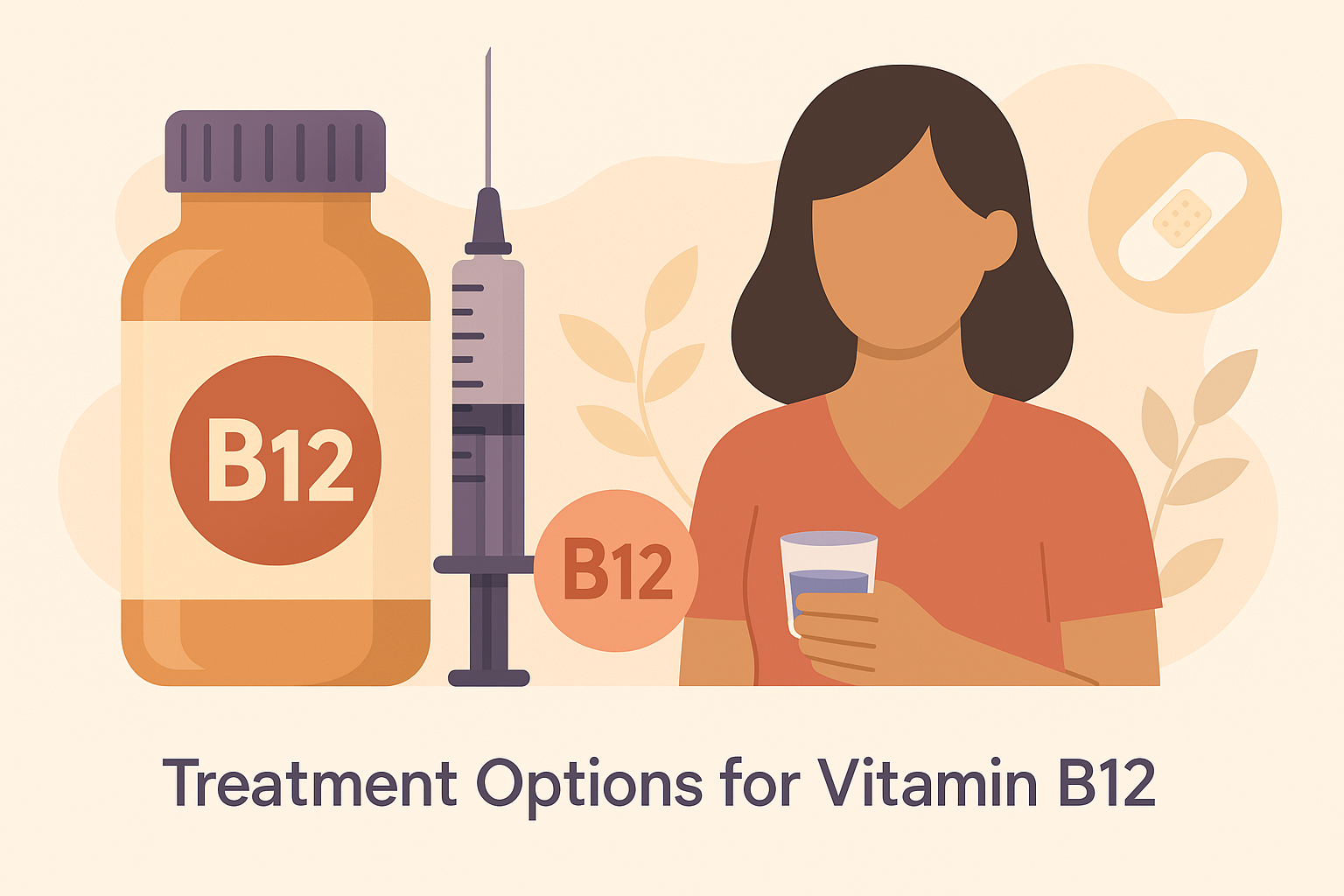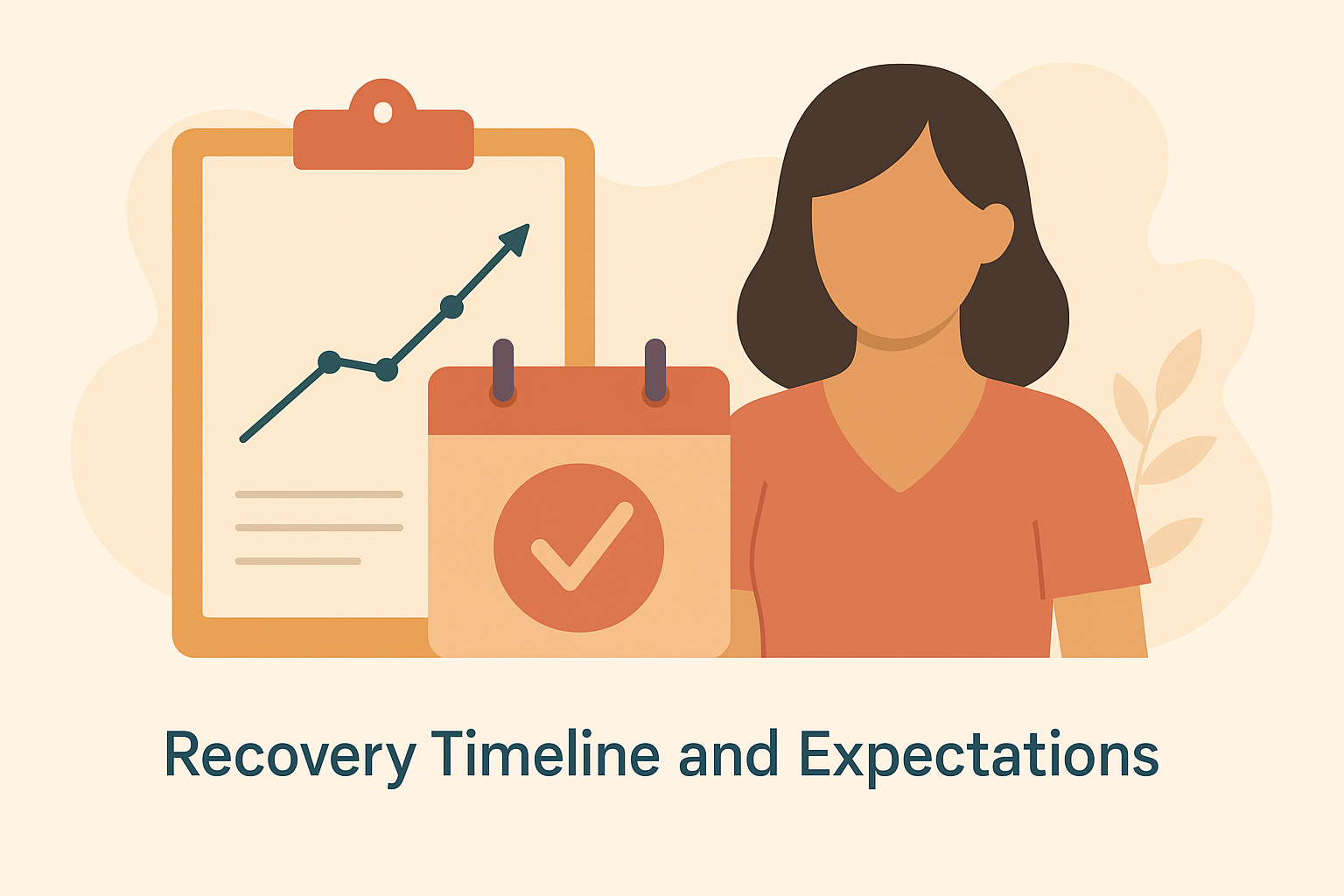Article: Top Tips for Recovering from Vitamin B12 Deficiency

Top Tips for Recovering from Vitamin B12 Deficiency
If you’re dealing with Vitamin B12 deficiency, your most pressing question is likely how to recover quickly and effectively while recovering from vitamin B12 deficiency. In this article, we’ll cover everything from recognizing symptoms to various treatment options. You’ll also learn what to expect during the recovery process and how to maintain healthy Vitamin B12 levels moving forward.
Key Takeaways
Vitamin B12 deficiency can arise from inadequate dietary intake, especially in strict vegans, or from absorption issues due to certain medical conditions.
Symptoms of Vitamin B12 deficiency are categorized into physical, neurological, and psychological, including fatigue, numbness, and depression, making early recognition essential for timely treatment.
Treatment options include dietary changes, oral supplements, and intramuscular injections, with recovery times varying based on symptom severity and adherence to the treatment plan.
Understanding Vitamin B12 Deficiency

Inadequate consumption or absorption of vitamin B12 often results in a deficiency. This can be particularly common among individuals following a strict vegan diet, which eliminates all animal-derived products, as they are primary sources of this nutrient. Certain conditions that reduce the body’s ability to absorb nutrients—such as autoimmune diseases or diminished stomach acid production—may also lead to vitamin B12 deficiency.
Vitamin B12 is essential for numerous critical functions within the body, such as:
Production of red blood cells
Support and maintenance of the nervous system
Metabolizing proteins and fats
Synthesis of DNA
Sustaining healthy brain function
A lack of sufficient Vitamin B12 hinders the proper formation of red blood cells, potentially causing health issues like pernicious anaemia among other complications.
Understanding these key points underscores why it’s crucial to ensure adequate levels of Vitamin B12 for overall health.
Recognizing the Symptoms of Vitamin B12 Deficiency

A deficiency in vitamin B12 can lead to a spectrum of issues classified into three principal types: physical, neurological, and psychological. Physical signs frequently encompass feelings of tiredness and weakness, as well as skin that may appear pale or take on a yellowish hue. Meanwhile, the array of neurological symptoms includes sensations such as numbness and tingling within one’s extremities alongside difficulties with balance.
Conversely, those suffering from a lack of vitamin B12 might also experience psychological effects like depression, disorientation, and problems with memory retention. It is crucial to identify these symptoms promptly to ensure an expedited diagnosis and initiation of treatment.
Physical Symptoms
Manifestations of vitamin B12 deficiency commonly emerge first with physical symptoms that can greatly interfere with everyday activities. Individuals often experience a sense of fatigue and weakness, turning even basic daily tasks into daunting challenges. This deficiency may lead to pale or jaundiced skin due to problems in red blood cell production. Unntended weight loss frequently accompanies these symptoms, typically along with diminished appetite.
Additional indicators include gastrointestinal issues such as nausea, vomiting, and diarrhea, which exacerbate the illness’s complexity. Some sufferers might endure discomfort from a sore mouth or tongue.
These diverse signs underscore the extensive influence of vitamin B12 deficiency on myriad bodily functions and underline the importance of prompt recognition and intervention for those affected by it.
Neurological Symptoms
The presence of neurological symptoms due to a vitamin B12 deficiency can be particularly unsettling and intrusive. Symptoms frequently encompass sensations such as numbness and tingling in the hands and feet, which may impede routine tasks and movement. Issues with balance are also typical, increasing the risk of falls that could result in harm.
A deficit in Vitamin B12 can compromise a normally functioning nervous system, underscoring the importance of ensuring sufficient levels of this nutrient for one’s general health.
Psychological Symptoms
For the system to ensure seamless operation of all its processes, it is essential that it functions properly.
Symptoms related to psychology such as depression, confusion, memory lapses and irritability can cause great distress. The presence of these symptoms can drastically reduce one’s quality of life by making daily activities difficult and straining relationships with others.
Subsequently:
Psychological symptoms may encompass:
Depression
Confusion
Issues with memory
Irritability
These psychological signs are capable of profoundly disrupting an individual’s quality of life by complicating simple day-to-day tasks and interpersonal interactions.
It is critical to promptly recognize these symptoms in order to accurately diagnose and treat them because they are frequently misidentified as other health conditions.
Diagnosing Vitamin B12 Deficiency
When symptoms suggestive of Vitamin B12 deficiency emerge, which can escalate if not addressed, the initial step is often to consult a healthcare provider who may recommend undergoing a blood test. Such blood tests are designed to measure hemoglobin levels and identify any reductions that could signal a potential deficiency. An increase in the size of red blood cells is another indicator pointing towards Vitamin B12 deficiency.
At times, confirming pernicious anemia—a disorder impeding the absorption of Vitamin B12—may require conducting Testing. This might include performing additional blood tests aimed at identifying specific antibodies associated with this condition. Should there be complexities in determining the root cause of the deficiency, it might become necessary to seek out a specialist’s expertise for diagnosis confirmation. It’s crucial that diagnosis is precise in order to facilitate successful treatment and recovery from such deficiencies.
Treatment Options for Vitamin B12 Deficiency

There are a variety of approaches to address vitamin B12 deficiency, each tailored to cater to the unique requirements and root causes of an individual’s condition. Options for treatment include adjustments in diet, oral supplements, and intramuscular injections. It is critical that the chosen treatment plan provides the most beneficial outcomes.
To delve deeper into these methods:
Dietary Changes
Dietary changes typically serve as the first line of defense against Vitamin B12 deficiency. Vitamin B12 can be found in various foods. Good sources include meat, fish, milk, cheese, eggs, and fortified cereals. Increasing the intake of these foods can help boost Vitamin B12 levels. For those following a vegan diet, fortified foods such as dairy alternative milks and yeast flakes can provide the necessary Vitamin B12. Vegetarians can obtain Vitamin B12 from dairy products and fish.
Post-recovery, continuing to consume foods rich in Vitamin B12 is important for maintaining healthy levels. This can help prevent a recurrence of the deficiency and ensure overall health and well-being.
Oral Supplementation
Taking oral supplements is an efficient way to increase Vitamin B12 levels, which is especially important for individuals with certain dietary limitations, including vegetarians and vegans.
Various forms of oral Vitamin B12 are available, such as tablets, capsules, and lozenges that dissolve under the tongue. These options support people in fulfilling their daily need for Vitamin B12.
Intramuscular Injections
It is essential to have a healthcare provider evaluate your condition if you are considering intramuscular injections of Vitamin B12 due to serious deficiencies, absorption problems, or an urgent need for replenishment.
Individuals diagnosed with conditions that affect their ability to absorb nutrients properly may find themselves needing regular intramuscular injections in order to maintain appropriate levels of Vitamin B12. Patients suffering from pernicious anemia typically require ongoing B12 injections throughout their lives for sufficient management of their Vitamin B12 status.
Recovery Timeline and Expectations

The time it takes to recover from vitamin B12 deficiency is dependent on how severe the condition is and the strategy employed for treatment. Individuals with mild symptoms of B12 deficiency might notice early signs of recovery within several days once they begin treatment, which could be reflected in restored normal values in blood tests related to vitamin B12.
Achieving total alleviation of symptoms can extend beyond three months or longer, based on specific personal factors. Factors such as general health status and commitment to following a prescribed treatment plan play a significant role in influencing the length of recovery time. It’s important to maintain patience and consistency throughout this process for complete healing from vitamin b12 deficiency.
Monitoring and Maintaining Vitamin B12 Levels
Monitoring and maintaining adequate Vitamin B12 levels are crucial for long-term health. The liver stores excess Vitamin B12, which can last 2 to 5 years, delaying deficiency symptoms. Regular monitoring of symptoms during recovery can help assess the effectiveness of the treatment. Keeping track of symptoms and consulting with the provider if there’s no improvement is vital.
Routine Vitamin B12 level testing verifies treatment effectiveness and ensures levels remain adequate. Frequent monitoring prevents relapse by keeping B12 levels within the normal range. Regular check-ups help identify if further adjustments in treatment are necessary if levels do not improve.
Risk Factors and Prevention
Some populations face a greater likelihood of suffering from vitamin B12 deficiency.
Persons above the age of 75 are especially prone to this condition because they often have problems absorbing the vitamin.
Risk also increases for those who are 60 and older.
Strict vegans or vegetarians may be more at risk and might have to regularly take Vitamin B12 supplements in order to fulfill their dietary needs.
To stave off vitamin B12 deficiency, it’s advisable to consume a diet that includes animal products or foods enriched with the vitamin. Health issues such as pernicious anemia and gastrointestinal disorders can severely impact the body’s ability to absorb Vitamin B12. Addressing any underlying digestive conditions is key in averting b12 deficiency.
Summary
To summarize, a deficiency in Vitamin B12 is a significant health concern that may manifest through numerous physical, neurological, and psychological effects. Prompt identification and accurate diagnosis are critical to successfully treat and recuperate from this condition. A variety of therapeutic strategies exist to correct the imbalance including adjustments in diet, oral supplements, and intramuscular injections which can assist in replenishing sufficient levels of Vitamin B12.
Proactive preventive tactics are essential for enduring wellness. These include consuming a Vitamin B12-rich diet as well as managing any underlying medical conditions that might be present. Being vigilant about your health by remaining knowledgeable on the subject allows you to preserve optimal Vitamin B12 levels thereby sidestepping potential adverse outcomes stemming from its scarcity.
Frequently Asked Questions
What are the common symptoms of Vitamin B12 deficiency?
Common symptoms of Vitamin B12 deficiency include fatigue, weakness, pale or yellowish skin, numbness, tingling in the extremities, balance problems, depression, confusion, and memory issues.
It is important to address these symptoms promptly for overall health.
How is Vitamin B12 deficiency diagnosed?
Vitamin B12 deficiency is typically diagnosed through a blood test that checks for low hemoglobin levels and larger-than-normal red blood cells, with further tests possibly required to confirm pernicious anemia.
What are the treatment options for Vitamin B12 deficiency?
Treatment for vitamin B12 deficiency may involve changes in diet, taking oral supplements, or receiving intramuscular injections. These approaches should be customized based on the severity and root cause of the B12 deficiency.
For proper management, it is critical to seek advice from a healthcare provider.
How long does it take to recover from Vitamin B12 deficiency?
Recovery from Vitamin B12 deficiency can start within a few days of treatment, but complete resolution of symptoms may take three months or longer, depending on individual factors.
Who is at a higher risk for Vitamin B12 deficiency?
Individuals over 75 years old, those aged 60 and older, strict vegans or vegetarians, and individuals with conditions such as pernicious anemia or gastrointestinal disorders are at a higher risk for Vitamin B12 deficiency.




Leave a comment
This site is protected by hCaptcha and the hCaptcha Privacy Policy and Terms of Service apply.